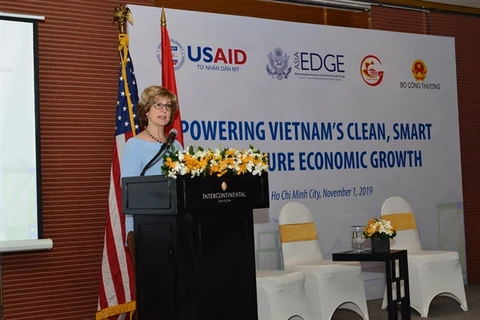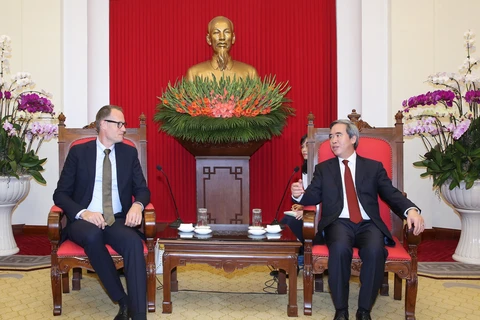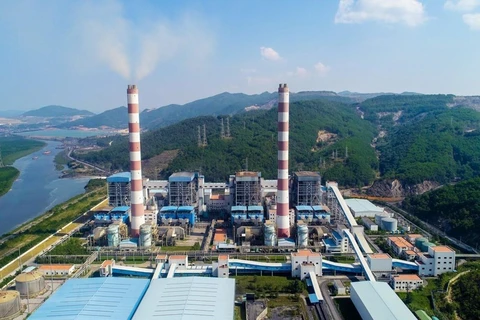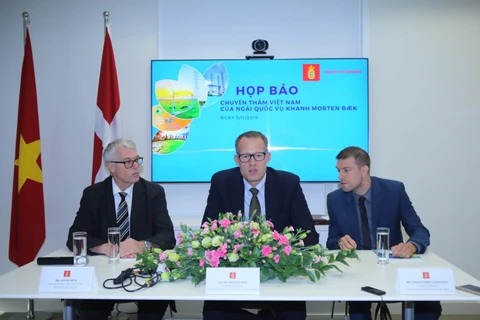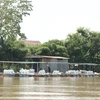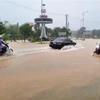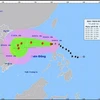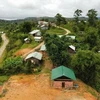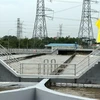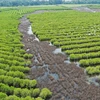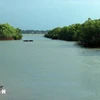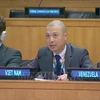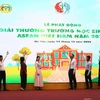Hanoi (VNA) - It is necessary for Vietnam to roll out a suitable strategy on sustainable energy development, according to Deputy Minister of Industry and Trade Dang Hoang An.
At the 3rd high-level meeting of the Vietnam Energy Partnership Group (VEPG) held in Hanoi on December 10, An laid a stress on the important role of the energy sector in the national economic development as well as welfare of local people, adding a strong strategy and long-term vision will support Vietnam to shift to green and comprehensive economy.
According to An, Vietnam’s demand for power grows at two digits every year in the past two decades. The demand is projected to surge in the time ahead to meet the nation’s industrialisation and modernisation, posing great challenges for the energy sector.
As many as 40 policy recommendations for a sustainable energy future in Vietnam were introduced at the event.
The recommendations focus on the five areas of renewable energy, energy efficiency, energy sector reform, access to energy, and energy data and statistics.
According to Rainer Brohm, an international coordinator of the VEPG’s Secretariat, the VEPG Technical Working Groups have worked to give support in solar feed-in tariff (FIT) price and revised solar power purchase agreements (PPAs), as well as rooftop solar power programme in Vietnam. Besides, they also helped Vietnam develop electricity wholesale market and Direct Power Purchase Agreements (DPPA).
However, more works need to be done to connect renewable energy to the national grid, and complete a competitive electricity wholesale market (including subsidy, cross power price and distribution costs), he added.
Deputy Minister An suggested the VEPG expand research and give more recommendations in other sectors such as oil and gas and coal as they are important energy forms in the nation.
The VEPG should focus more on measures to promote the use of rooftop solar power in residential areas and industrial parks, and attract more investment to renewable energy in industrial parks, as well as policies to branch out biomass energy, he said.
Meanwhile, Ambassador Pier Giorgio Aliberti, Head of the EU Delegation to Vietnam, believed that capital plays a crucial role in ensuring remote areas’ access to power.
As sustainable development of green energy depends on both domestic and foreign investors, the VEPG should help the Vietnamese Government outline consistent policies, he said, adding the EU stands ready to share knowledge with Vietnam to fulfill energy development targets.
“We have right now a great opportunity to shape the course of Vietnam’s energy development. This is a unique opportunity for us to join hands in recalibrating the course towards more sustainable energy, shifting away from polluting to cleaner energy sources. The effects of climate change are severe and growing in frequency and intensity, both here in Vietnam and around the world. Global and national transition processes to cleaner energy systems must be accelerated, with ambitious commitments from governments and with the strong support of development partners. The European Union remains fully committed to assist Vietnam in its transition from brown to green energy, while also ensuring access to affordable energy for all and protecting Vietnam's competitiveness,” he said.
Country Director for the World Bank in Vietnam Ousmane Dione said that the VEPG has given technical and financial assistance to Vietnam, and the World Bank also wants to make contributions to the success of Vietnamese energy sector.
It is necessary for the Vietnamese Government to improve its policies so as to ensure economic growth target and reduce emission.
“The success of the energy sector has been a key contributor to Vietnam’s socio-economic development. As we look forward, the sector is at an inflexion point and is poised for the next phase of its growth. The challenge is to ensure that the future energy demand is met, while also honouring environmental commitments by accelerating the transition to renewable energy and energy efficiency, in a financially prudent manner. Continued strong policy reforms and a balanced system-wide approach are necessary for the development of the energy sector. The World Bank will continue to work with the authorities and all development partners to create a world class energy sector in Vietnam.”
The 1st VEPG Stakeholder Forum, which followed the High-Level Meeting, hosted a select group of experts who shared their experience and debated prominent topics in Vietnam’s energy sector./.

